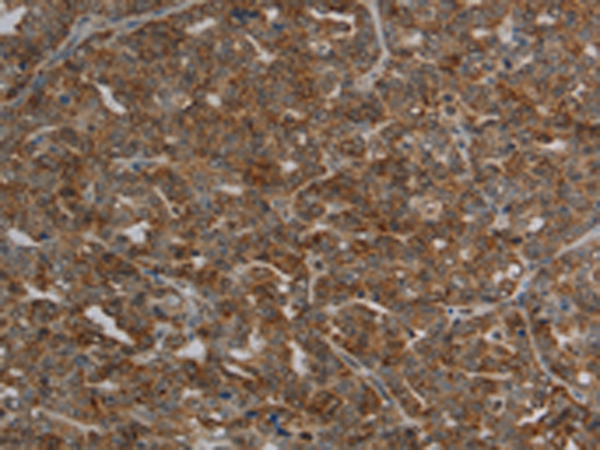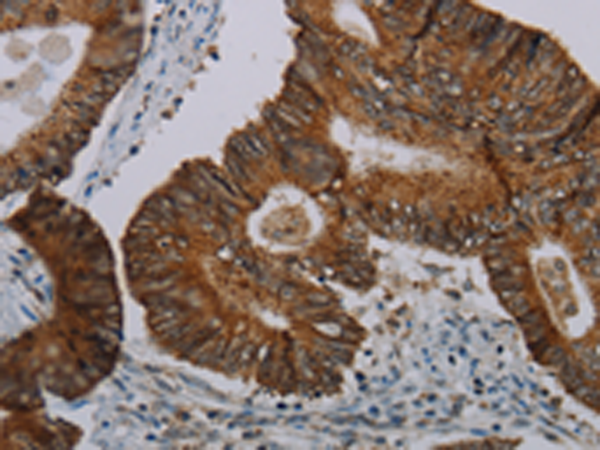


| WB | 咨询技术 | Human,Mouse,Rat |
| IF | 咨询技术 | Human,Mouse,Rat |
| IHC | 1/25-1/100 | Human,Mouse,Rat |
| ICC | 技术咨询 | Human,Mouse,Rat |
| FCM | 咨询技术 | Human,Mouse,Rat |
| Elisa | 1/1000-1/2000 | Human,Mouse,Rat |
| Aliases | CASH; FLIP; MRIT; CLARP; FLAME; Casper; FLAME1; c-FLIP; FLAME-1; I-FLICE; c-FLIPL; c-FLIPR; c-FLIPS; CASP8AP1 |
| WB Predicted band size | 55 kDa |
| Host/Isotype | Rabbit IgG |
| Antibody Type | Primary antibody |
| Storage | Store at 4°C short term. Aliquot and store at -20°C long term. Avoid freeze/thaw cycles. |
| Species Reactivity | Human, Mouse |
| Immunogen | Synthetic peptide of human CFLAR |
| Formulation | Purified antibody in PBS with 0.05% sodium azide and 50% glycerol. |
+ +
以下是关于CFLAR抗体的3篇代表性文献示例(注:内容为示例性概括,具体文献需通过学术数据库核实):
---
1. **文献名称**:*CFLAR modulates apoptosis and NF-κB activation in hepatocellular carcinoma*
**作者**:Li, X., et al.
**摘要**:研究利用CFLAR特异性抗体,发现CFLAR通过抑制caspase-8活性调控肝癌细胞凋亡,并促进NF-κB通路活化,提示其作为肝癌治疗潜在靶点。
2. **文献名称**:*Structural basis of CFLAR recognition by therapeutic antibodies in autoimmune diseases*
**作者**:Zhang, Y., et al.
**摘要**:通过X射线晶体学解析CFLAR抗原表位与单克隆抗体的结合模式,揭示抗体通过阻断CFLAR与FADD相互作用缓解炎症反应,为自身免疫病药物开发提供结构基础。
3. **文献名称**:*Targeting CFLAR with siRNA and monoclonal antibodies enhances chemosensitivity in lung cancer*
**作者**:Wang, H., et al.
**摘要**:结合CFLAR抗体与化疗药物,显著增强肺癌细胞对顺铂的敏感性,证实CFLAR高表达与化疗耐药相关,抗体干预可逆转耐药表型。
---
如需具体文献,建议通过 **PubMed** 或 **Web of Science** 检索关键词“CFLAR antibody”或“c-FLIP therapeutic targeting”获取最新研究。
The CFLAR (CASP8 and FADD-like apoptosis regulator) antibody is a tool used to study the CFLAR protein, a key regulator of apoptosis and necroptosis. CFLAR, also known as c-FLIP, shares structural homology with caspase-8 but lacks proteolytic activity. It exists in multiple splice variants (e.g., FLIP-L, FLIP-S) that modulate death receptor signaling pathways, including those initiated by Fas, TNF, and TRAIL. By competing with caspase-8 for binding to FADD in the death-inducing signaling complex (DISC), CFLAR inhibits caspase-8 activation, thereby suppressing apoptosis. Additionally, it regulates necroptosis by interacting with RIPK1 and RIPK3. CFLAR’s dual role in cell survival and death makes it a critical focus in cancer, autoimmune diseases, and neurodegenerative disorders.
CFLAR antibodies are essential for detecting protein expression, localization, and post-translational modifications in techniques like Western blotting, immunohistochemistry, and flow cytometry. They help elucidate CFLAR’s context-dependent functions—pro-survival in some cancers (e.g., resistance to chemotherapy) or pro-apoptotic in others. Researchers also use these antibodies to study CFLAR interactions with signaling partners and its role in inflammatory responses. Validation of CFLAR antibodies is crucial due to splice variant specificity and cross-reactivity risks. Commercial antibodies are typically raised against epitopes in the N-terminal DED domains or C-terminal regions, with applications spanning basic research and therapeutic development targeting CFLAR-related pathways.
×